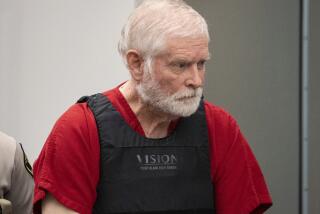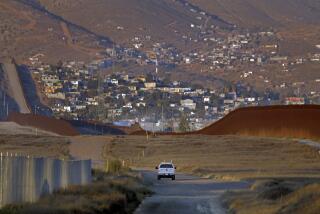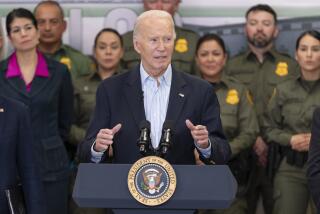Border Patrol agent is indicted in fatal shooting of Mexican teen
A Border Patrol agent has for the first time been indicted on a murder charge after shooting and killing a Mexican national through the border fence.
The border Arizona shares with Sonora, Mexico, is a hot spot for getting “rocked,” which is Border Patrol shorthand for pieces of concrete that are thrown at agents over the fence. The Border Patrol’s policy is to treat such rock-throwing as a threat to agents’ lives, and they are permitted to respond with lethal force.
On Oct. 10, 2012, Agent Lonnie Swartz fired at least 10 rounds through the border fence into Nogales, officials said. At least eight rounds struck Jose Antonio Elena Rodriguez, 16, who bled to death.
It is common for agents to shoot through the border fence, and they usually avoid discipline in such cases.
But on Wednesday night, a grand jury handed up an indictment of second-degree murder. “Lonnie Ray Swartz, did with malice aforethought, and while armed with a P2000 semiautomatic pistol, kill” Jose Antonio Elena Rodriguez, the panel’s presiding juror wrote.
Border Patrol union representatives have resisted scrutiny of agents’ actions in similar cases, saying that such analysis would force agents to waste valuable seconds considering their response rather than acting to protect themselves or their fellow agents.
The National Border Patrol Council, a union that represents agents, said it would mount a vigorous defense of Swartz.
“It is unfortunate that after three years and after being investigated by multiple local, state and federal agencies and then returned to the field to work, Agent Lonnie Swartz is now facing criminal charges,” the union said in a message posted on its website.
“Sadly, our agents and all law enforcement officers operate in a world of political agendas and armchair quarterbacking. But our jobs are dangerous and the decisions we make every day determine if we will return home safely to our families,” the statement said.
The Border Patrol has acknowledged that it has a problem with agents shooting foreign nationals. For example, new rules say that agents under assault with rocks should first retreat, rather than shoot, and should avoid firing at people in cars.
Gil Kerlikowske, commissioner of U.S. Customs and Border Protection, has said the agency is engaging in fewer incidents in which its personnel use force — though numbers for the period from October 2014 to April 2015 show that agents were still engaging in about two use-of-force incidents per day.
Rodriguez’s family has filed a civil suit against Swartz. “We are pleased that the Justice Department has taken this first step in pursuing justice for Jose Antonio’s family,” said attorney Lee Gelernt of the ACLU, which is representing Rodriguez’s family. “The family has waited a long time for this and is gratified that the United States government will pursue justice for Jose Antonio.”
Sean Chapman, Swartz’s attorney, did not respond to multiple calls seeking comment. He told the Arizona Daily Star that he expects his client to plead not guilty at an Oct. 9 arraignment. He called Rodriguez’s death tragic.
An internal report obtained by the Los Angeles Times last year criticized the Border Patrol for lack of diligence in shooting investigations and found that agents sometimes used questionable tactics when using deadly force, such as intentionally standing in the path of a car to justify shooting at the driver.
The Border Patrol pushed back hard against the report’s recommendation that agents refrain from responding to rock-throwing with deadly force.
The agency rejected two major recommendations in the report: barring border agents from shooting at vehicles unless its occupants are trying to kill them, and barring agents from shooting people who throw things that can’t cause serious physical injury.
People throwing rocks have attacked agents more than 1,700 times since 2010, according to the agency.
In 2013, after reviewing internal files on 67 deadly force cases, a group of police experts criticized the Border Patrol for weak internal investigations and for use-of-force guidelines that gave agents far more latitude than is allowed by most U.S. law enforcement agencies.
The report suggested a pattern of abuse and little public accountability. It said agents at times fired in frustration rather than when they faced a serious threat from people trying to smuggle contraband or sneak across the border.
Border Patrol officials initially rejected the report’s conclusions. But after a change of leadership last year, the agency adopted guidelines that incorporated many of the police group’s recommendations.
For more national news, follow @nigelduara
More to Read
Start your day right
Sign up for Essential California for news, features and recommendations from the L.A. Times and beyond in your inbox six days a week.
You may occasionally receive promotional content from the Los Angeles Times.







